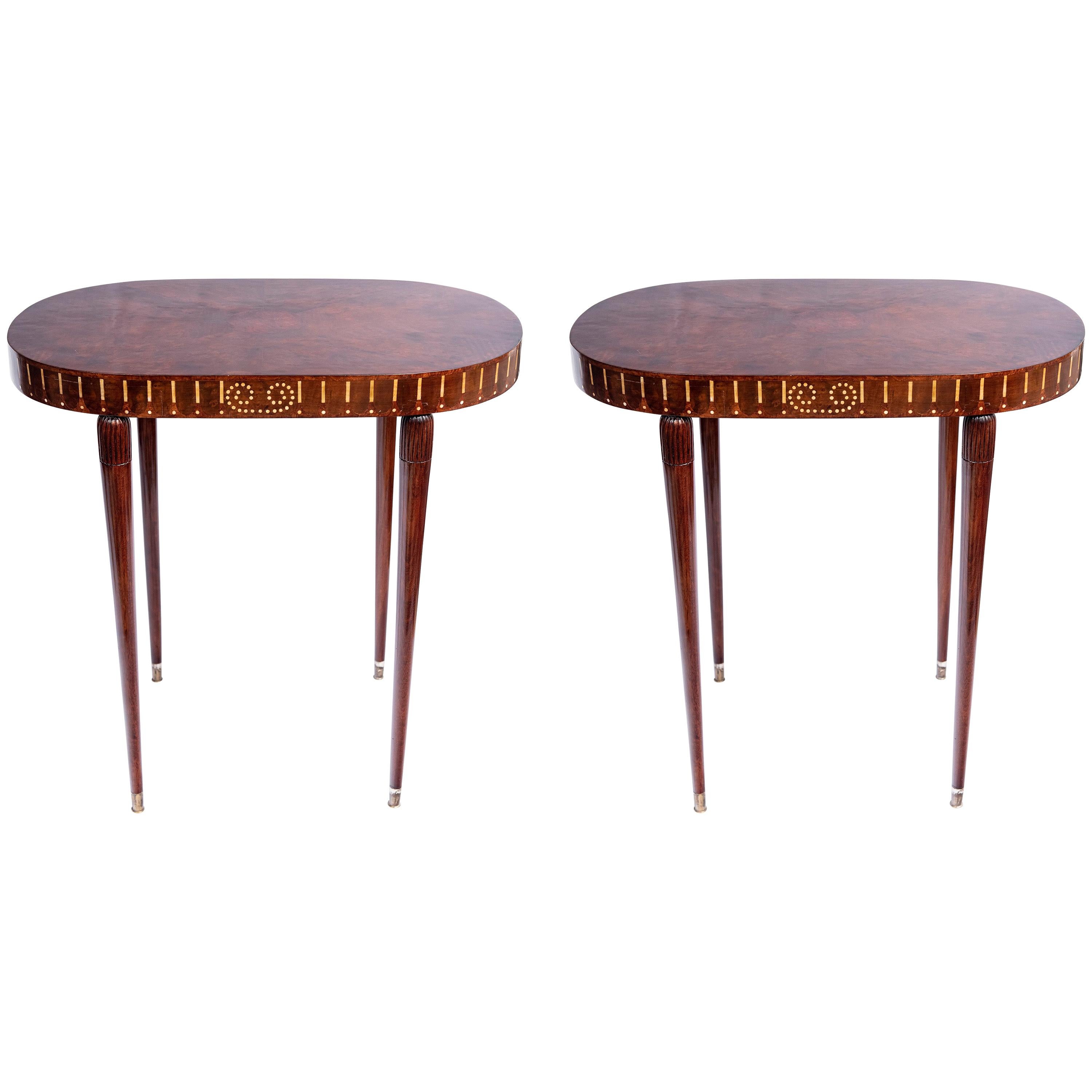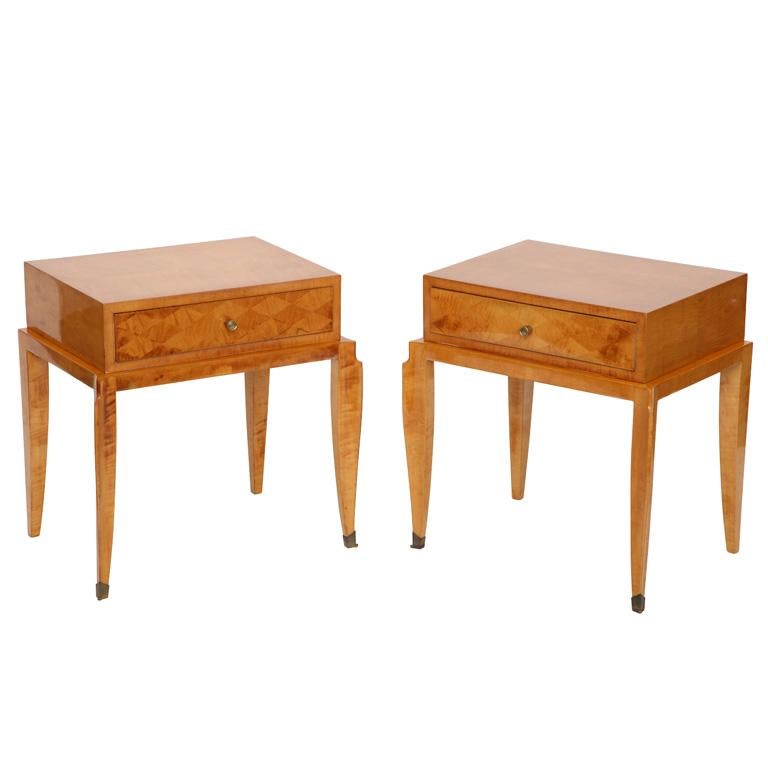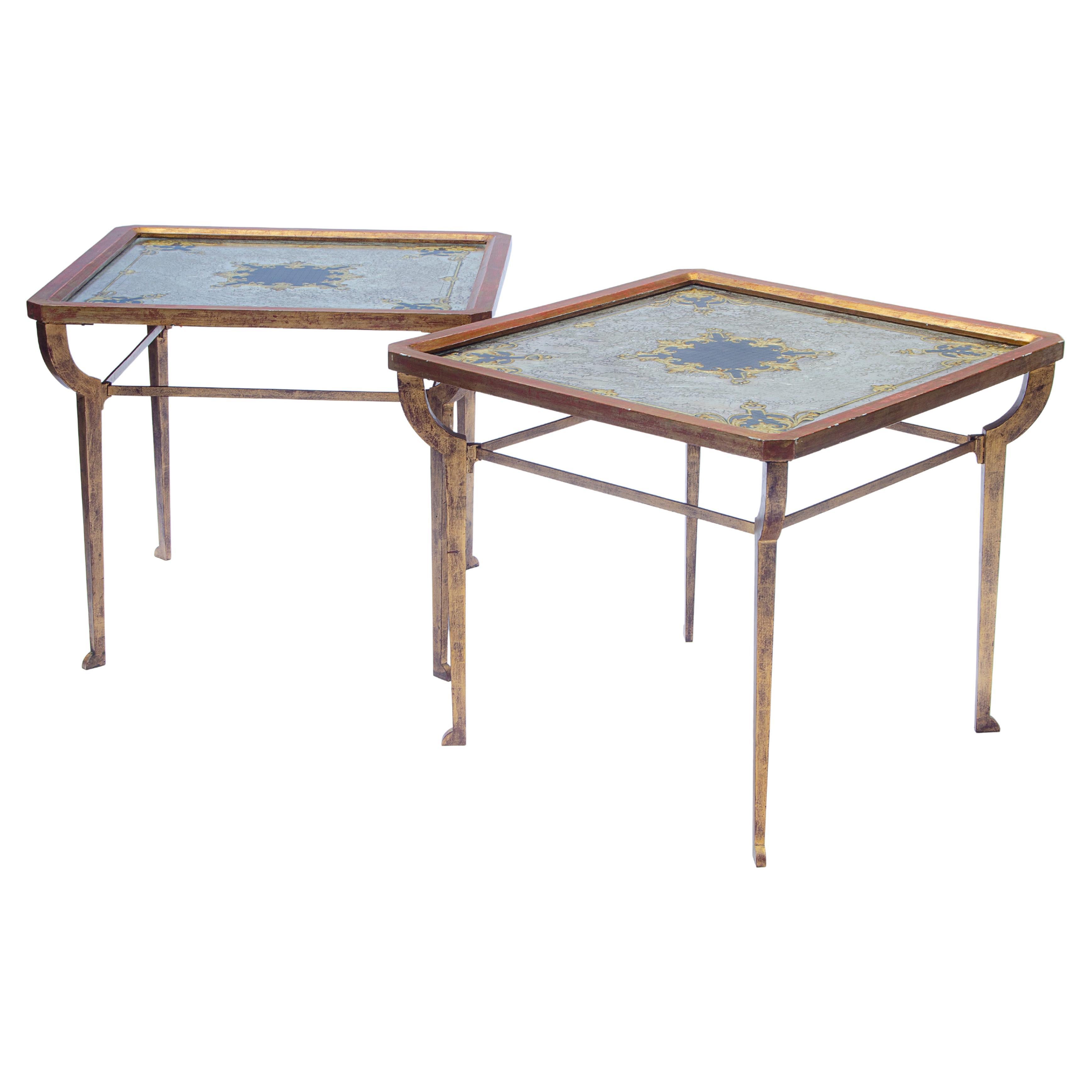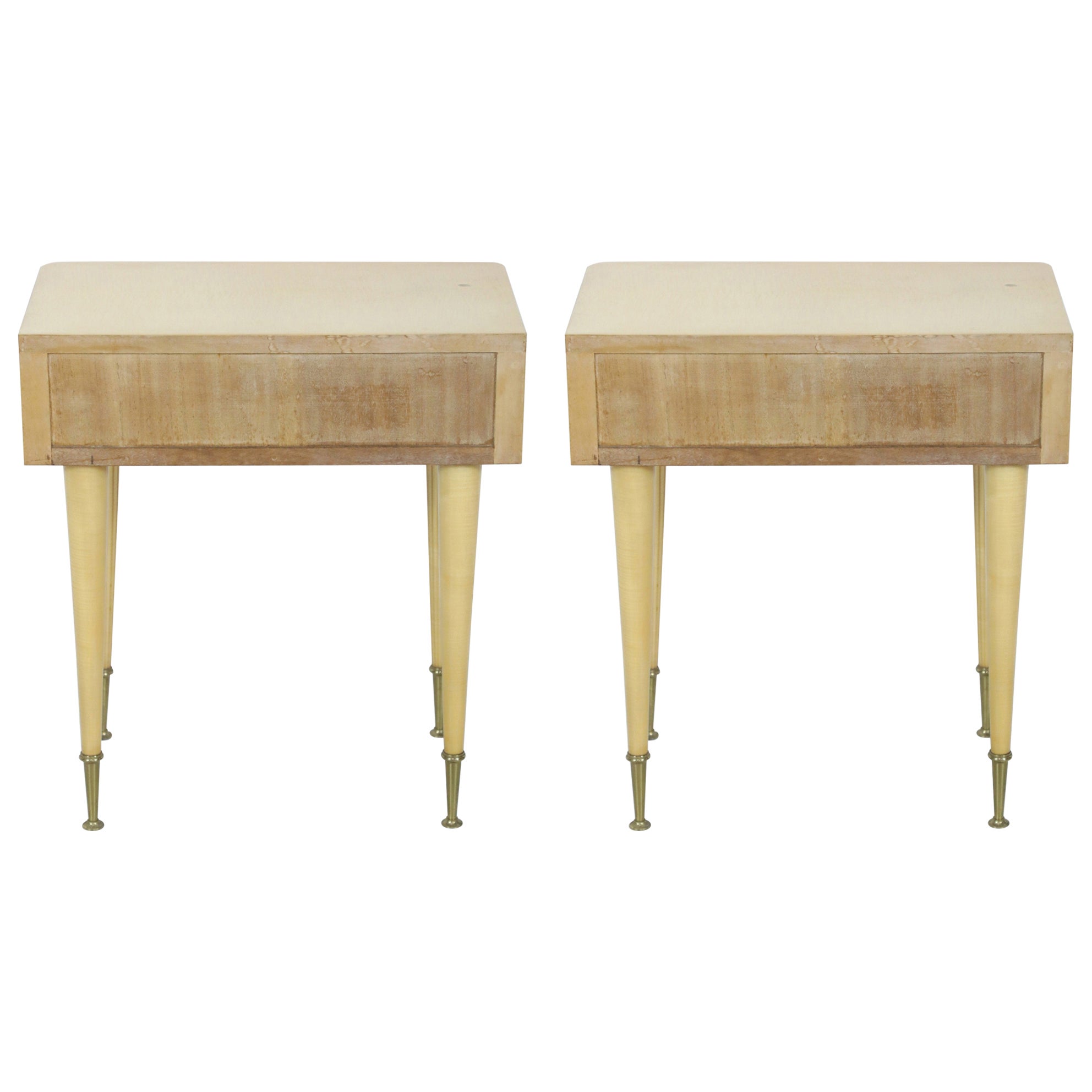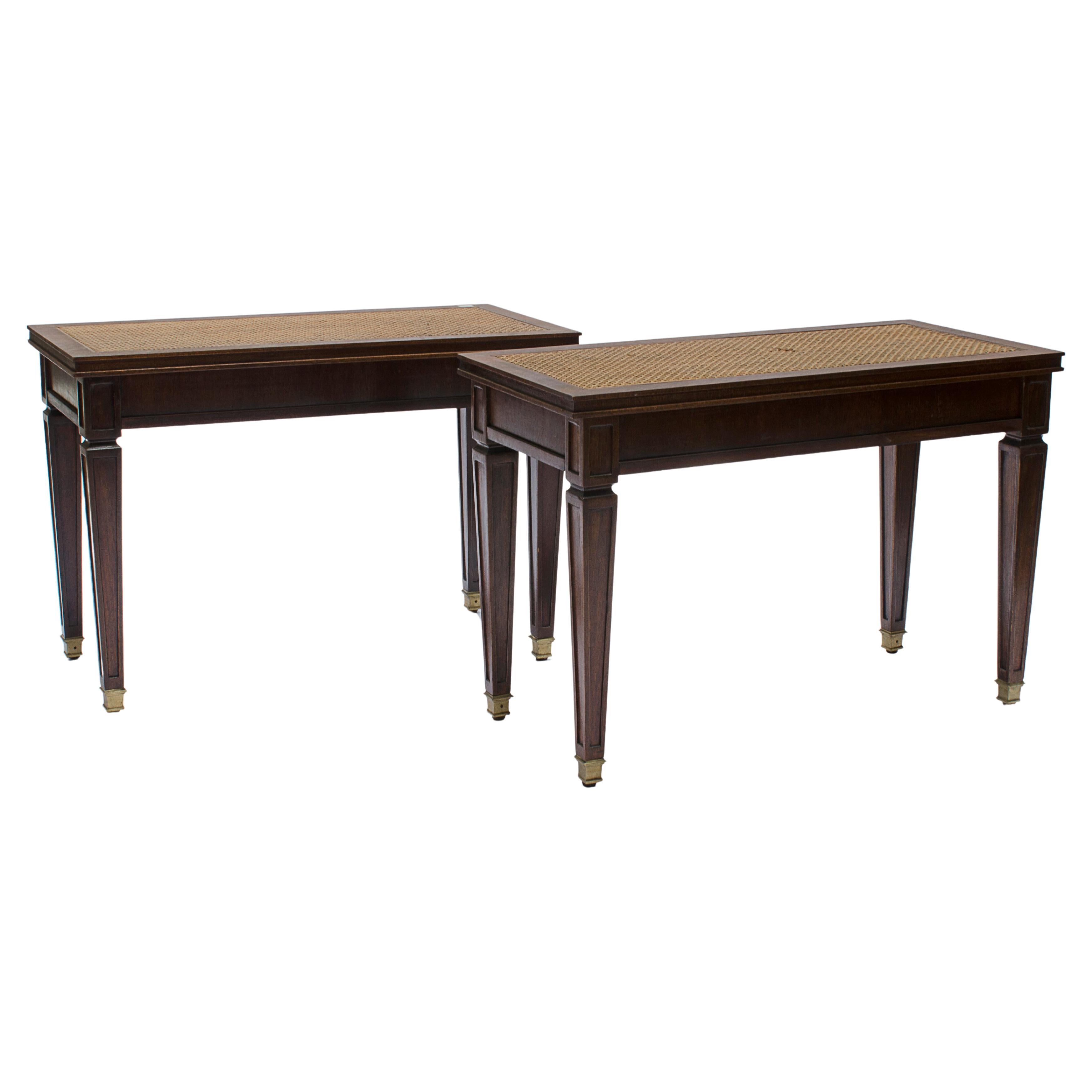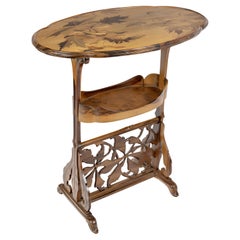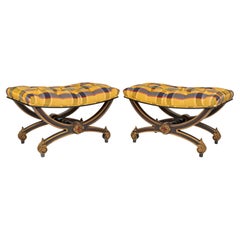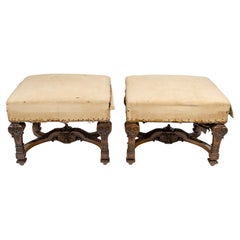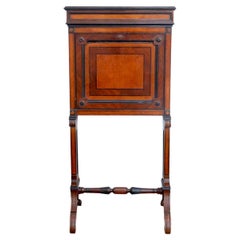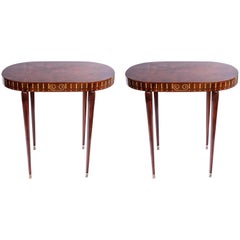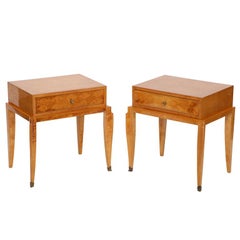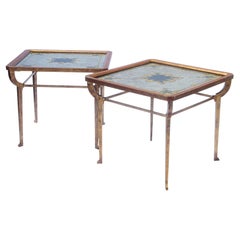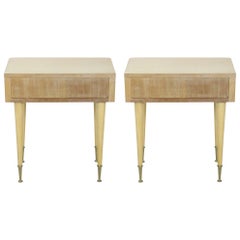Items Similar to A French Pair of Side-Tables in the style of André Arbus (1903-1969), circa 1920
Video Loading
Want more images or videos?
Request additional images or videos from the seller
1 of 10
A French Pair of Side-Tables in the style of André Arbus (1903-1969), circa 1920
$3,423.02per set
$6,846.04per set50% Off
£2,606.96per set
£5,213.92per set50% Off
€2,900per set
€5,800per set50% Off
CA$4,798.30per set
CA$9,596.61per set50% Off
A$5,249.47per set
A$10,498.93per set50% Off
CHF 2,741.70per set
CHF 5,483.39per set50% Off
MX$62,732.40per set
MX$125,464.81per set50% Off
NOK 34,445.67per set
NOK 68,891.35per set50% Off
SEK 32,418.82per set
SEK 64,837.63per set50% Off
DKK 22,089.88per set
DKK 44,179.77per set50% Off
About the Item
A French Pair of Side-Tables in the Style of André Arbus (1903-1969)
circa 1920
Pair of Art Deco Side-Tables
Resting on 4 feet in X shape, joined together with a horizontal gilt brass brace entretoise.
Opening with a drawer
Bronze ornamentation such as drawer pulls, brace and sabots
Circa 1920
André Arbus has a real sense of the aestheticism that he wants to give each of his furniture objects. It is purely material, yet also a spiritual search, achieved by adding charm and a humanistic touch to all of his executions. Arbus' fashion of conceiving furniture won over the public because the arguments for soul comforting pieces completed the actual physical comfort of the works. Rapidly, the Arbus models gave birth to a style that a number of young decorators contributed by their variations to expand this style. The mix of logic and delicacy put Arbus in the family of the classiques francais. André Arbus was born in 1903, Toulouse, France. Arbus received an apprenticeship in cabinetry in Toulouse, in the atelier of his father and his grandfather. He then establishes himself in Paris in 1932. In 1933, Arbus obtained the Prix Blumenthal de la decoration and created some invaluable, robust furniture pieces. As if established by an architect, they are logically equipped with bases, facades, entablatures, sculptural ornaments and painting all of which heighten the eloquence of his vast selection of cabinetry. In Arbus' furniture design, he doesn't wish for a tactical return to the Decorative era of the XVIII century, but rather to inherit some of the virtues from this illustrious lineage. Arbus' furniture tempts, with his original thought and the means that become available to mankind in the 20th century, to perpetuate their work and their savoir-faire. Having thought about structure and furniture in architecture, Arbus must adapt his dominating ability to larger plans and manage these, all while continuing his efforts in cabinetry. He advances in the art of construction with the Maison de la famille francaise at the Exposition of 1937 and also at the Palais au Salon des Artistes Decorateurs (1939). In 1942, he constructs many farmhouses in the prairies of Crau with the collaboration of Lucien Rollin. And on the Ilot du Planier, near Marseille, he becomes the designer of the most powerful lighthouse on the Mediterranean. Then Arbus is hired as the architect and decorator for a large ocean liner that is constructed in Newcastle and becomes the South American line. The extent of Arbus' creative register shows us in this circumstance that various elements of the decoration will be like furniture (illustrious glass from Venice, wrought-iron ramps, brackets, etc.), conceived by Arbus in view of the harmony that they present together. It is always on a spiritual basis that Andre Arbus, who was led by classical reasoning and architectural sense, undertakes his work up to the point where function becomes the glance at a refined and agreeable object. He died in 1969, in Paris.
- Similar to:André Arbus (Cabinetmaker)
- Dimensions:Height: 21.46 in (54.5 cm)Width: 19.3 in (49 cm)Depth: 11.23 in (28.5 cm)
- Sold As:Set of 2
- Style:Art Deco (Of the Period)
- Materials and Techniques:
- Place of Origin:
- Period:
- Date of Manufacture:circa 1920
- Condition:Wear consistent with age and use.
- Seller Location:Saint-Ouen, FR
- Reference Number:1stDibs: LU2612340720232
About the Seller
4.8
Vetted Professional Seller
Every seller passes strict standards for authenticity and reliability
1stDibs seller since 2017
70 sales on 1stDibs
Typical response time: 3 hours
- ShippingRetrieving quote...Shipping from: Saint-Ouen, France
- Return Policy
More From This Seller
View AllÉmile Gallé (1846-1904) An Art Nouveau occasional marquetery table circa 1900
By Émile Gallé
Located in Saint-Ouen, FR
Émile Gallé (1846-1904)
An Art Nouveau occasional marquetery table circa 1900
Walnut and marquetry occasional table
The shaped oval top inlaid with marquetry veneer decoration depic...
Category
Antique 1890s French Art Nouveau Tables
Materials
Wood
A French Napoleon III Pair of Louis XVI Style Curule Stools, circa 1900
By Maison Jansen
Located in Saint-Ouen, FR
A French 19th Century Pair of Large Rectangular Curule Stools
Partially gilt, blackened and red lacquered wood, carved decoration with acanthus leaves and rosaces.
The 4 feet linked by a stretcher.
Louis XVI Style
Napoléon III Period
Circa 1900
Used tartan chintz upholstery
Attributed to Maison Jansen
Jansen, the French Luxury
Opulence, refinement, audacity of style marriages… so many words agree with Maison Jansen. Through this name, a whole era sounds like a reminder of a certain French chic…
Some names evoke immutable images, atmospheres... Like Jansen, for example. Let’s close our eyes… The 1960s and 1970s are at their peak. France is doing well. It is a country of full employment where everything seems possible. Within the international Jet Set, a carefree crowd of movie stars, public figures, literary idols and crowned heads, we love the Maison Jansen, its taste for styles struck with a good quality exuberance, and its brilliant side.
It all began in 1880, when the Dutchman Jean Henri Jansen founded the eponymous house in Paris. Jansen is part of the continuity of these world-famous furniture manufacturers and companies that operated under the Second Empire and at the time of the Universal Exhibitions, as the ‘Escalier de Cristal’ teaches.
At that time, the Union Centrale des Beaux-Arts appliqués à l'Industrie and the Société du musée des Arts Décoratifs merged to form the Union Centrale des Arts Décoratifs.
Supported by both gallery owners, collectors and manufacturers, this
organization gives the «la» to the whole profession, and in the prevailing politico-ideological slump (France was defeated by Prussia in 1871 and Napoleon III is in exile), the ‘Union Centrale des Art Décoratifs’ focuses production on the celebration of past styles. While this nostalgia evokes memories of an era that we imagine more stable, an innovative exoticism will be all the rage: the reign of Turkish style and Japonisme.
The Jansen house masterfully rushed into the «exotic» trend, but quickly
developed a style derived from the ornamental splendor of the eighteenth, then a little later, so-called «imperial» styles mainly intended for royal families. After the First World War, J.H Jansen was joined by the cartoonist Albert Cazes, by Stéphane Boudin and by Pierre Delbée, who successively directed the house when it disappeared in 1929. At the end of the Kennedy era, Boudin completely redecorated the White House, at the request of the First Lady, Jackie, who had fallen in love with his work after discovering it at Malmaison.
In 1971, Jansen joined forces with Leleu-Deshays and continued its quest for excellence. From 1969 to 1979, the dandy decorator Serge Robin took the reins of the house, granting it an eclectic and luxurious style: he revisited the great eras of French art, from the Renaissance to Louis XVI, by modernizing them with more contemporary pieces in Plexiglas or wrought iron. His recom-posed and sophisticated style met with resounding success. When Jackie Kennedy, who became the wife of the great Greek shipowner Aristotle Onassis, moved to France, the young architect married Louis XVI-style furniture to modernist designs from the 1950s.
When the Shah of Iran decided to celebrate the 250th anniversary of the Persian Empire in 1971, Serge Robin and his teams turned to the grandiose and ephemeral setting of Persepolis. A hundred semi-trailers then left the workshops on Rue Saint-Sabin to reach Teheran. At the same time, Princess Soraya of Iran commissioned her a sumptuous palace for Avenue Montaigne, the princes Faisal bin Fahd of Arabia and Mubarak Al-Sabah, and the Agnelli snatched it.
On the French side, he puts his talent at the service of Brigitte Bardot, for whom he completely revamped the Madrague and the Lannes boulevard.
Serge Robin embodies all the audacity of the name Jansen with the most im-probable weddings. With him, Plexiglas tables, Japanese chairs from the 50s, gold thread curtains, zebra sofas and leather Louis XVI style chests of drawers decorated the most fashionable apartments of the «seventies».
All the best stories have an end. At the dawn of the 1990s, weakened by the changes of a society plagued by concern, the disappearance or the remoteness of noble families, and the increasing scarcity of bourgeois residences, the Jansen house lost its aging clientele. The brand is missing the turn of modernity, and cannot adapt to changes in society, changing tastes, and the importance of design.
In 1989, it was closed. Jansen has not disappeared from the landscape: the house’s creations are still present on the market and in the French auction houses, but also in the United States, where they are very appreciated. Transparent Plexiglas tables, leather and metal armchairs, zebra sofas, exotic cabinets...
Category
Antique 1890s French Napoleon III Stools
Materials
Wood
A Large Pair of French 19th Century Louis XIV Style Rectangular Stools
Located in Saint-Ouen, FR
A Large Pair of French 19th century Louis XIV Style rectangular stools
Four baluster feet very finely carved with acanthus leaves, arabesques, and gadroons joined by a strecher
Circa...
Category
Antique 1880s French Louis XIV Stools
Materials
Beech
$3,895 Sale Price / set
40% Off
19th Century French Secretaire Flap "Billet Doux", Also Called "Portfolio"
Located in Saint-Ouen, FR
Secretaire flap "Billet douce", also called "portfolio"
Veneer of Amboyna burl, rosewood and blackened sticks, resting on two pilasters carried by two fluted pads connected by a turned and fluted spacer.
It opens with a flap, Interior in lemontree presenting, in addition to a tablet sheathed in leather, mail lockers and a pen tray with its original glass tank...
Category
Antique 1830s French Louis Philippe Desks and Writing Tables
Materials
Wood
$4,060 Sale Price
20% Off
A 19th Century French Heart-Shape Louis XV Style Table
By Maison Krieger
Located in Saint-Ouen, FR
A 19th Century French Heart-Shape Louis XV Style Table
Elegant heart-shaped Louis XV style table
Decorated with a beautiful floral marquetry and a gilded ormolu mount.
Supported by...
Category
Antique 1860s French Louis XV Tables
Materials
Wood
$6,491 Sale Price
35% Off
Large Wrought-Iron Art Deco Console, attributed to Raymond Subes, circa 1930
By Raymond Subes
Located in Saint-Ouen, FR
Large Wrought-Iron Art Deco Console, attributed to R.Subes, circa 1930
Impressive and elegant French Mid-Century 1930 modernist / late Art Deco wrought-iron console
Attributed to R...
Category
Antique 1880s French Art Deco Architectural Elements
Materials
Griotte Marble
$52,500 Sale Price
30% Off
You May Also Like
Pair of Wood Side Tables, Art Deco Style, France, circa 1930
Located in Buenos Aires, Buenos Aires
Pair of wood side tables. Art Deco style, France, circa 1930.
Category
Vintage 1930s French Art Deco Side Tables
Materials
Wood
In the Manner of Jean Pascaud, Pair of Art Deco Side Tables, France, circa 1950
By Jean Pascaud
Located in New York, NY
Pair of Art Deco side tables in the manner of Jean Pascaud. Blond mahogany, oak marquetry, bronze sabots, France, circa 1950.
Category
Vintage 1930s French Art Deco Side Tables
Materials
Bronze
Pair of tables by Marc Du Plantier
By Marc du Plantier
Located in Ciudad Autónoma Buenos Aires, C
Pair of tables designed by Marc Du Plantier (1901-1975). Iron structure with gold leaf finish, mirrored glass top with wooden frame also with gold leaf finish.
France, CIRCA 1940.
Category
Vintage 1940s French Art Deco Side Tables
Materials
Iron
$28,000 / set
Pair of French Art Deco Style Maple End Tables
Located in Queens, NY
"Pair of French Mid-Century (1940s) low sycamore end tables with a single drawer and two brass pulls with fluted front legs and tapered back legs, all ending in brass sabots. (PRICED...
Category
20th Century French Mid-Century Modern Side Tables
Materials
Metal, Brass
$2,800 / set
Pair of side tables by COMTE
By Comte S.A.
Located in Ciudad Autónoma Buenos Aires, C
Pair ofs ide tables by COMTE. Oak wood and original caning.
Argentina, CIRCA 1940.
Category
Vintage 1940s Argentine Art Deco Side Tables
Materials
Oak
$24,000 / set
Pair Art Deco Side Tables - Vintage Furniture 1930
Located in Potters Bar, GB
- Gorgeous pair of art deco side tables
- Round tops with gilt perimeter
- Clean and minimal design perfect for contemporary interiors
- Offered in great shape ready for home use
- W...
Category
Vintage 1930s Side Tables
Materials
Wood
More Ways To Browse
Lineage Furniture
Two Tier Mersman Tables
Two Tier Parlor Table
Used Olive Drums
Vietnamese Rosewood
Vintage Arthur Court Lily
Vintage Cork Side Table
Vintage Howell Modern Metal Furniture
Weiman Antique Tables
Wendell Castle Collection
Z Shaped Side Table
19th Century Octagonal French Bamboo Table
6 Leg Table Chippendale
Aalto 907
Aalto Table 907
Acrylic Trunk Table
Acrylic Z Table
Adams Always Furniture
